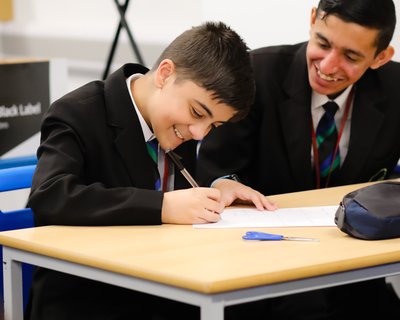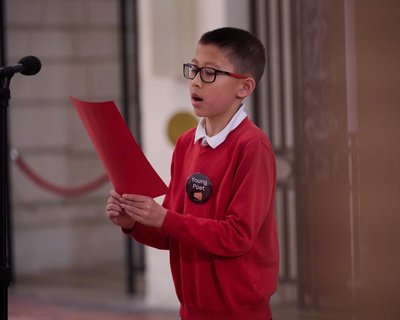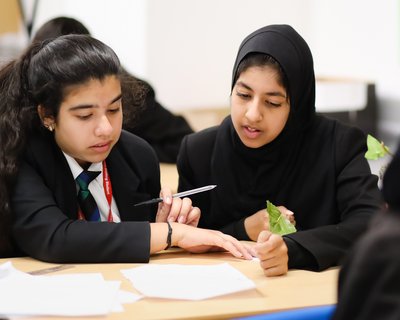The downward trend in the number of children and young people writing for pleasure in the UK continues into 2025, according to our latest research.
Our latest report, supported by Twinkl, which explores children and young people’s writing enjoyment in their free time paints a troubling picture of declining enjoyment, motivation and habits, with concerning long-term implications for learning and literacy outcomes.
However, building on 15 years of research and practice, we are committed to championing writing for pleasure as a vital part of every child and young person’s development, wellbeing, and as a means to support them to engage with a digital-first world.
What is writing for pleasure?
Writing for pleasure can be defined as the act of writing because of a person’s own choice and volition as a means of satisfaction. It could be argued that there are two types of pleasure in writing. Namely, writing as pleasure (enjoyment) and writing for pleasure (satisfaction).
Our 2025 report focuses on the moment when writing becomes far more than academic achievement, test-based attainment and skill, and can instead be a deeply personal pursuit. Writing for pleasure therefore is an expressive act tied to creativity, emotional wellbeing and identity.
Why is it important?
When children enjoy writing and write daily in their free time, there are tangible benefits to their writing skills, critical thinking skills, confidence, creativity, and wellbeing.
“Writing for enjoyment helps children process the world, find their voice, and make sense of who they are. It builds empathy, sharpens critical thinking, and gives them the tools to express what matters.”
Sharna Jackson, author of the High Rise Mystery series

More content
What does our research say in 2025?
Our 2025 Annual Literacy Survey of nearly 115,000 children and young people aged 5 to 18 from across the UK confirms a deepening disengagement from writing.
Building on 2024 findings that drew attention to a sustained decline in writing enjoyment, the 2025 report reveals:
-
Only 1 in 4 (26.6%) young people aged 8 to 18 say they enjoy writing in their free time.
This marks a near halving of writing enjoyment over the past 15 years.
-
Just 1 in 10 (10.4%) write something in their free time each day.
In fact 61% fewer children and young people are writing daily in their free time today compared with 2010.
-
A decline in younger children's enthusiasm for writing enjoyment
Younger children, particularly those aged 8 to 11, have historically shown higher levels of writing enjoyment but this year’s data shows they are now losing enthusiasm fastest.
However…
… a trend that has remained consistent over 15 years is that pupils eligible for free school meals (FSM) are consistently more likely to enjoy writing in their free time than their peers not receiving FSM (31.1% vs 25%).
These young writers, often assumed to be less engaged, are more likely to write daily, in varied formats, and with a strong sense of ownership and other motivating factors.
“The findings offer a sobering view of writing culture in the UK but also point to actionable insights. By focusing on what motivates children and young people, particularly autonomy, creativity, and personal and cultural relevance, they are far more likely to engage with it on their own terms. That’s where true progress begins.”
Jonathan Douglas, CEO of the National Literacy Trust

More content
What are some of the motivating factors for writing for pleasure?
For the students who are demonstrating a desire to write daily in their free time, writing is not just about academic success, it is a deeply personal, expressive act tied to creativity, emotional wellbeing, and identity.
Even those children who don’t enjoy writing would be motivated to write if they were able to tap into these significant motivating factors:
-
Choice
Being able to choose their own topics.
-
Style
The autonomy to select their writing style.
-
Personalisation
The freedom to respond to inspiring prompts and draw inspiration from memorable experiences that they wanted to share.
“My favourite part [of the Power of Voice writing project] was when we looked at people who are famous activists. It really inspired me and made me realise I can make a difference, and even if it’s a small difference, it’s still a difference.”
One pupil’s experience of our programmatic work

These motivators could serve as vital entry points to rekindle writing enthusiasm, particularly among younger children, who remain more open to re-engagement than teens, more of whom are motivated by writing that is connected to their individual interests, aspirations and life experiences.
Give children choice
Choice in the format of writing plays such an important role.
While paper-based writing remains the most common format, less enthusiastic writers showed a preference for digital writing often through formats connected to music, media, and personal communication (such as song lyrics, reviews, scripts).
This underscores the importance of recognising diverse writing formats in any effort to reignite interest.
As evidenced by our recent reading for pleasure research, we need to meet children and young people where they are at and provide freedom for them to explore writing styles and formats in order to ignite new passions for self-expression and creative discovery.
Poetry is for everyone
Discover the how poetry can be an empowering and accessible way into both writing and reading for children and young people.

How we are helping with this?
Our flagship Young Writers programme continues its crucial mission to embed writing for pleasure practices, working with schools, businesses, and charities as part of a multi-sector approach to shift perspectives on writing. You can read our report which explores how our programmatic approach supports writing for enjoyment.
We are urging government to consider the significance of writing for pleasure as part of its Writing Framework and prioritising writing for pleasure in the implementation of Curriculum and Assessment reforms.
We are continuing to promote and explore a myriad ways that children and young people can access the benefits of writing. Poetry is one way. Poetry doesn’t have to be perfect. It can provide a new freedom to begin writing for pleasure and creating without rules - there's no “doing it wrong”.
BRAND NEW: Young Poet Laureate programme
Inspire the next generation to express themselves creatively through poetry. Introducing Young Poets Week, a week-long celebration in November 2025 and exploration of poetry in all its exciting forms – from rhyming couplets to rap, sonnets to spoken word! Followed by an exciting new opportunity for young creative talent across the country to apply to be a Young Poet Laureate for their region.

Writing for pleasure in schools
Explore a range of high-quality resources, expert-led CPD and training, and programmes to support teachers to nurture your students' love of writing and access techniques to equip pupils with both the skill and the desire to write.

-
This report brings together insights from the various writing programmes that sit within Young Writers to highlight the important role they can play in the lives of children and...Learn more about The Impact of Writing for Enjoyment Programmes.
-
Discover how we used our research-led approach to underpin our understanding of localised need and create our latest three-year writing programme, funded by the Goldsmiths’ Foundation.Learn more about How partnership, our place-based approach and research shaped our latest children’s writing initiative.
-
New Chapters supports young people involved with the criminal justice system through the power of creative writing.Learn more about New Chapters.
Writing and the future of Literacy
We know that we live in a digital age where generative-AI tools to both write and read texts are increasingly prevalent and will play a key role in the literacy lives of our children and young people.
We are committed to work with families and teachers to discover ways to equip children with the writing skills they need to ensure they get the most out of what AI can offer. It is critical that we empower young people with the ability to add their own thoughts and check outputs with an analytical eye.
This is something we will be exploring in depth in our forthcoming reports that seek to understand young people and teachers' use of generative AI to support literacy in 2025, and as part of our Future of Literacy work.
-
But what does this look like in reality and how do we begin to define what it means?Discover more
-
Is there a way that children and young people can access vital literacy skills through gaming? Our Director of Education reflects on his own experiences of engaging with...Read more
-
These reports share findings on children, young people and teachers' use of, and attitudes to, generative AI and literacy in 2024Read our report
 Donate here and together, we can ‘build spaces where writing isn’t just assessed, it’s celebrated’.
Donate here and together, we can ‘build spaces where writing isn’t just assessed, it’s celebrated’.






